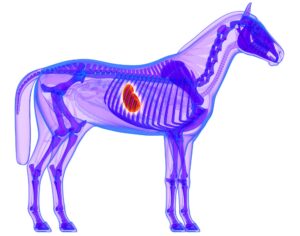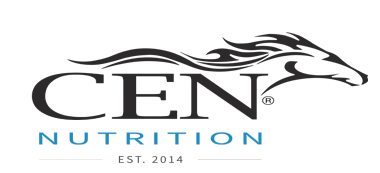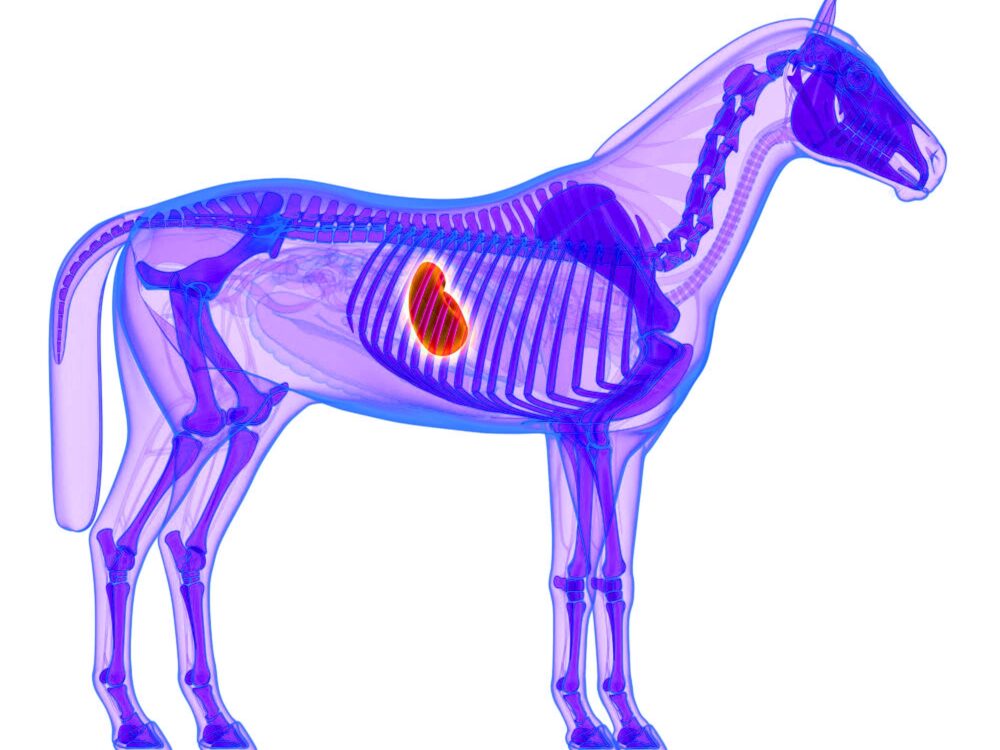
What are the causes of ulcers?
HOW CAN GASTRIC ULCERS IN HORSES BE PREVENTED?
This article reviews all aspects of gastric ulcers in horses. One of the most common digestive issues in horses are Gastric ulcers (ulceration of the stomach lining).
In fact, nearly all performance horses will exhibit gastric ulcers at some point in their career.
Ulcers are commonly found in the top half of the equine stomach which has a non-protected squamous lining.
The bottom half of the equine stomach secretes acid continuously even if the stomach contents is empty, however it is protected by a glandular lining.
WHAT ARE THE CAUSES OF ULCERS?
Due to the sensitive anatomical structure of a horse’s stomach, many factors can make horses prone to gastric ulcers such as:
- Stress
- Diet filled with concentrate feeds
- Insufficient Roughage
- Transportation
- Physical exertion
Horse Stomach Lining Damage
The unprotected lining of the equine stomach can be protected by a steady supply of saliva and forage.
The modern feeding practices of one or two large meals per day leaves the stomach empty for extended periods, increasing the risk of ulcer development.
Exercise can increase the risk of the acid ‘splash’ onto the upper unprotected layer, this is particularly evident with horses in heavy work where the stomach moves abruptly against the diaphragm.
The equine stomach capacity is only 7-15 litres, it is naturally designed to digest a steady stream of forage throughout the day.
Therefore free choice forage is one of the main keys to lowering ulcer risk.
Chewing creates saliva which acts as a natural buffer (pH average 7.5) and choosing a low sugar and starch grassy hay e.g Rhodes Grass will provide good fibre levels for digestion and stimulate salvia production.
A fibre based diet is best suited for a horse, whereby high-starch grains should be avoided as they increase the production of gastrin, a hormone that stimulates gastric acid production.
Damage of the Equine Stomach Lining due to Parasites
Bot infection has also been associated with gastric ulcers.
The consumption of the eggs of botflies is common by horses and the larvae can exist in the stomach and create pits. These pits can be irritated by acid or bacteria which can lead to ulcers.
In recent studies, it has been shown that larvae are becoming more resistant to anti-parasitic drugs. Treatment with oral wormers, is a simple and effective way to control bots.
Stomach lining Compromised Due to Bacteria
Recently studies have shown that certain bacteria cause ulcers in humans and that it is hypothesised this may be one of the causes of ulcers in horses.
Prof B.Marshall showed that the presence of the bacteria Helicobacter causes inflammation or some irritation in the lining of the stomach.
Damage of the Stomach Lining due to Drug Use
The overuse of ‘Bute’ (phenylbutazone) and other non-steroidal anti-inflammatory drugs (NSAID’s) is known to disrupt the protective layer and cause ulcers. Short term use is recommended to return to normal health, then seek natural alternatives that treat the cause not the symptoms of the condition.
WHAT ARE THE SYMPTOMS OF EQUINE GASTRIC ULCERS?
The majority of the horses won’t show obvious signs of ulcers.
Studies have shown that the only way to definitively diagnose ulcers is to perform a complete gastroscopic examination.
The common symptoms of Ulcers can be:
- Attitude change
- Body condition decline
- Poor appetite
- Poor performance
- Low energy
- Sensitivity in the flank area
- Unwillingness to work
- Windsucking or weaving
- Dull Hair Coat
- Frequent Colic
HOW TO PREVENT GASTRIC ULCERS IN HORSES
Naturally, as with all common horse health problems, prevention is better than treatment.
The following strategies can help lower the risk of ulcers in horses:
- Feed small frequent meals as horses’ stomach are designed to eat this way in a pasture
- Reduce the grain in the diet
- Allow access to pasture or a low sugar/starch roughage 24/7
- Avoid long term use of anti-inflammatory drugs such as ‘Bute’ (phenylbutazone)
- Allow your horse to take a break from intense training
- Keep your horse well exercised and socialised
- Use Natural supplements to help heal and protect the gastric lining.
WHAT ABOUT HORSE ULCER TREATMENT MEDICATIONS?
Ulcer medications including Omeprazole and Ranitidine turn down/block acid production in the horse’s stomach. (proton pump inhibitor)
Stomach acid is vital for protein digestion and absorption of key vitamins and minerals such as calcium and magnesium.
The acid in the stomach is also important as a barrier against micro-organisms and parasites in the environment entering further down the digestive system.
Long term use of ulcer medication can be risky. Evidence from human research that long term use of Omeprazole impacts calcium absorption, which has been linked to an increased risk of osteoporosis where bones become weak and there is the risk of fracture.
Short term use would lower this risk.
This has caused some nutritionists and researchers in equine nutrition to question the long term use of Omeprazole in horses.
SIDE EFFECTS OF ULCER TREATMENT MEDICATIONS
Dr. Juliet Getty – an internationally respected independent equine nutritionist, believes that concerns are reasonable because what happens in a horse’s stomach is not that different from human digestion.
“What happens in humans is that these medications not only reduce protein digestion, but they also inhibit the absorption of key minerals and vitamins, such as magnesium, calcium, vitamin D, and vitamin B12” said Getty.
Dr. Joe Pagan (Kentucky Equine Research president) similarly was concerned how Omeprazole’s suppression of digestive acid in the horse’s stomach affects digestion.
Pagan conducted a digestion trial with four idle Thoroughbreds that evaluated how well the horses were able to digest two sources of calcium. (BMC and limestone)
This was conducted with and without two weeks of Omeprazole administration at the recommended therapeutic dose (4 mg/kg per day).
“The source of calcium and the Omeprazole both significantly affected calcium digestibility” Pagan said.
Pagan also found that serum gastrin was doubled in the horses on Omeprazole. Gastrin is a hormone produced by the stomach to stimulate gastric-acid secretion.
“In studies with other animals and humans, increased gastrin has also led to increases in parathyroid hormone [PTH] production, and there was a trend toward increased PTH in this study” Pagan said.
PTH causes the body to pull calcium from the skeleton to maintain blood calcium, which is essential to support muscle and nerve function. Chronically elevated PTH may lead to osteoporosis or holes in the bone that reduce bone strength and mass.
Long-term Omeprazole use combined with other factors such as high-oxalate pastures may compromise calcium balance, which is of special concern due to its vital role in skeletal health.
A NATURAL ALTERNATIVE TO ULCER MEDICATIONS?
By feeding horses according to their natural physiology, and by taking steps to protect and promote overall digestive health, we can reduce the risk of gastric ulcers.
With the prevalence to treat ulcers with medications such as Omeprazole (Ulcerguard), CEN has developed a unique natural product that helps heal and protect the stomach, working with the physiology of the horse, rather than against it.
Short term use of ulcer medications is warranted to lessen the severity of ulcers, for a long term option; CEN Ulcer Protect which can be used in conjunction with medication to aid in the healing and then help protect thereafter.
CEN Ulcer Protect is a unique natural formulation which may help reduce, heal and protect the gut from the incidence of ulcers.
Written by Bryan Meggitt (BMedSc. PGCrtMedSc.)
Biochemist / Senior Scientist and Co-founder of CEN Horse Nutrition
Bryan is a scientist and equine nutrition educator through the nutrition principles of Dr Juliet Getty and Dr Eleanor Kellon.
Bryan is passionate about improving equine health through natural nutrition according to science.
Further References:
https://www.sciencedirect.com/science/article/abs/pii/S0737080619306008?via%3Dihub

